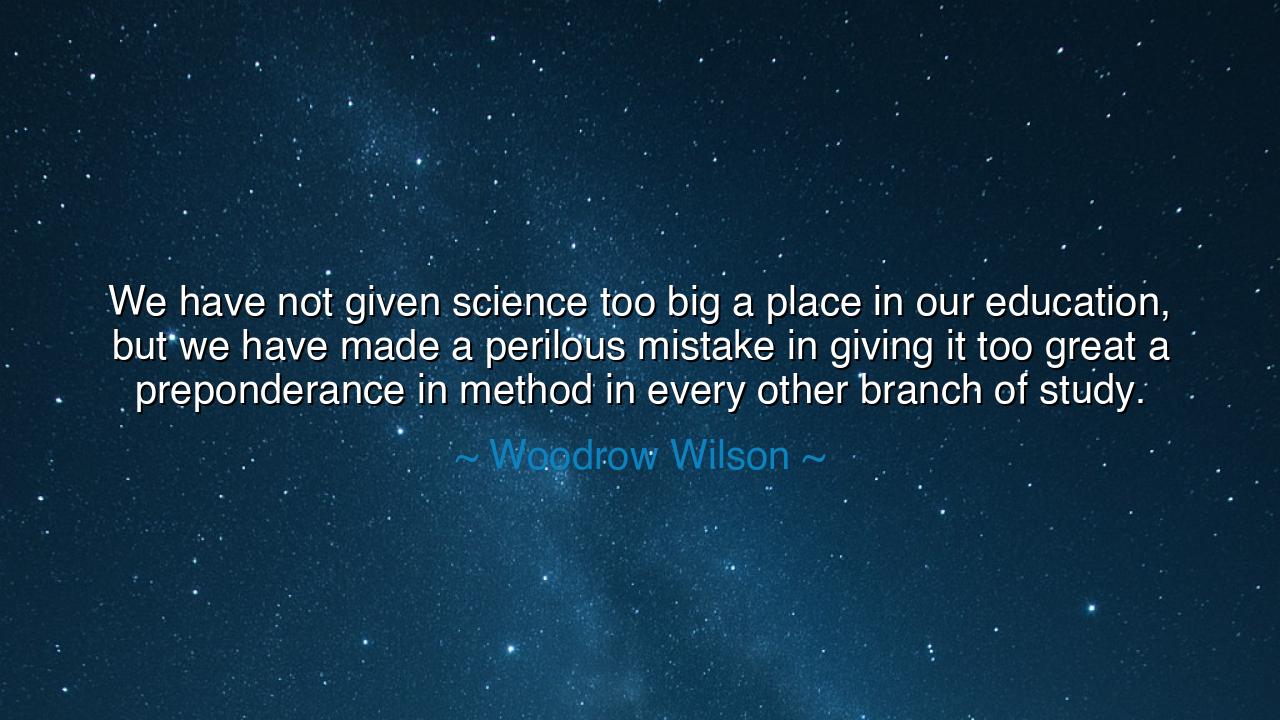
We have not given science too big a place in our education, but
We have not given science too big a place in our education, but we have made a perilous mistake in giving it too great a preponderance in method in every other branch of study.






Woodrow Wilson, the scholar-president, once warned with grave wisdom: “We have not given science too big a place in our education, but we have made a perilous mistake in giving it too great a preponderance in method in every other branch of study.” These words, though spoken long ago, resound with timeless urgency. Wilson is not condemning science itself—he honors its role in progress—but he cautions against turning every form of knowledge into an imitation of its methods. For not all truth can be measured in numbers, nor can every human mystery be solved in formulas.
The origin of this thought is rooted in the transformation of education in the late 19th and early 20th centuries, when the scientific revolution inspired schools to adopt rigid methods of analysis and quantification. Wilson, himself a former professor and president of Princeton University, saw how this overemphasis on method risked suffocating the spirit of the humanities. History, literature, and philosophy were being taught as if they were laboratories, their living truths reduced to charts and systems. He feared that the soul of education—the shaping of character, imagination, and moral vision—was being overshadowed by the dominance of the scientific approach in every sphere.
History offers us examples of what Wilson feared. Consider the Soviet Union’s obsession with centralizing all branches of learning under rigid scientific control. Poetry and art were censored, history was rewritten to fit the “scientific” model of Marxist inevitability, and individuality was crushed. The overextension of scientific method into every field strangled the human spirit and reduced richness of thought to mechanical propaganda. In contrast, societies that balanced science with the arts and humanities—nurturing not only engineers but also poets, philosophers, and leaders of conscience—found resilience in times of upheaval.
The deeper meaning of Wilson’s words is that education must be whole. Science is a mighty lamp, illuminating the workings of nature, the secrets of the body, the mechanics of the universe. But the lamp cannot light the inner world of man—the questions of justice, beauty, love, and purpose. These belong to the realm of literature, history, and philosophy, where method cannot replace wisdom, and measurement cannot replace meaning. When every discipline bows to the same method, we gain knowledge but risk losing humanity.
Wilson speaks, too, to the danger of raising generations who can calculate but not dream, who can analyze but not feel, who can build machines but not guide them with compassion. For what use is the scientist’s discovery of atomic power without the philosopher’s counsel of ethics? What use is the engineer’s bridge if the poet does not inspire men to cross it toward peace rather than war? The peril he names is not in science itself, but in letting its dominance silence other forms of truth.
The lesson for us is clear: cherish science, but do not let its method rule all things. Let schools teach not only equations but also stories, not only experiments but also the great questions of the soul. For a society that neglects its poets, artists, and historians in favor of pure calculation will one day find itself rich in machines but poor in wisdom. Balance is the law of life, and in education, balance between science and spirit is the key to a flourishing people.
Practical action lies before us. Parents and teachers must encourage students to embrace the sciences with curiosity, but also nurture the arts and the humanities with equal reverence. Leaders must craft policies that fund not only laboratories, but also libraries and theaters. And each of us must remember in our daily lives that knowledge is not only about control but also about meaning, not only about facts but about truth.
Thus Woodrow Wilson’s warning stands as a torch across the generations: do not confuse the greatness of science with the supremacy of its method. Let us build an education that is broad, alive, and human—where the precision of science walks hand in hand with the wisdom of philosophy, the compassion of history, and the fire of art. Only then shall knowledge serve not only progress, but the fullness of life.






AAdministratorAdministrator
Welcome, honored guests. Please leave a comment, we will respond soon